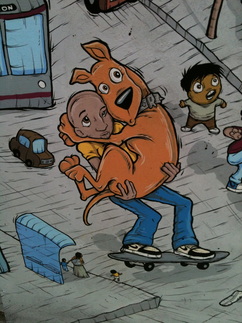 Tree in Los Osos / Alison R. Choosing three words that best express my philosophy of life provides endless hours of pleasure. Elizabeth Gilbert entitled her bestselling book with her three words: Eat, Pray, Love. I saw the movie and liked the “eat” part best. Ann Lamott calls her new book on prayer, Help, Thanks, Wow. Until last week, my three as yet unpublished words were “Oh, And, Yes.”
I’m not going to spend a lot of time explaining these words because I replaced them two days after Thanksgiving. My “Oh” sounds like “Oh, I didn’t know that, but it is a pleasure to learn.” “And” means more or different information isn’t a contradiction but an addition. And “Yes” expresses my willingness to acknowledge whatever arises.
But on my way back from my Thanksgiving visit to my son, 28 year-old grandson and five-year-old granddaughter in Los Osos, I came up with a new three-word philosophy. I kept the “And” as crucial to non-duality, and put “This” in the first and third position to produce “This And This.”
To imagine me discovering meaning in these particular three words, two of which are the same, you have to see me behind the wheel on cruise control with inactive feet and legs, traveling north on 101 around 7:30 a.m., arms equidistant from each other on the wheel. Just as the thought of multiple ways of perceiving the world came to mind, I had an “Oh” moment and my arms vibrated. I needed that embodied experience to know that this thought has legs. I was thinking about the other grandma to my granddaughter and contrasting our styles of grandparenting.
In Los Osos both of us were staying in my son’s house, sharing the pleasures and the frustrations of our five-year-old charge. At first, the other grammy’s style annoyed me. Why should the child need her long hair brushed out of her eyes every time it ecaped from its rubber band? She could see well enough, as far as I could tell. Moreover, each time the brush neared her, she screamed and tossed her unkempt hair into real disarray. Faced with such a mop head, I mostly didn’t care enough to press the issue. However, the other grammy approached the problem stealthily, circling behind the couch, grabbing the hair and somehow with much reassurance that it would not hurt and would only take a minute, tying it back again. This gambit gained her temporary control.
I admit I preferred my way of coping with stray hair, the no-way way. I thought that by insisting at that moment, the other grammy needed to imprint the little girl’s experience with her approval or disapproval. That was my way of sitting by and judging. I, on the other hand, sat silent or played with the little girl as if I too were five.
Leaving Los Osos and the other-grammy experience behind, I had that “Oh” moment in the car. It occurred to me that one way of being with this child might not be better than the other. Did both ways have value? Did I think the order-imposing grammy was inferior to the grammy who mostly let the child have her own way?
I must have really needed to feel good about myself, even at the expense of the other grammy. Was I hoping the child would prefer me to her? After all, she was also the grammy who snuck gum and candy to the little girl despite daddy’s rules. But aren’t grandparents usually the ones who spoil the child? My son’s beloved Grandma Doris certainly spoiled him every chance she got. Maybe the other grandma had it more right than I did, and I was just trying to excuse being lazy in the grandparenting department.
As I drove north early Saturday morning leaving the other grammy there for two more days, I started to rethink my reaction to all things not me or my way. Oh, what if one grandmother doesn’t have to be better than the other? What if I don’t need to feel right and could accept everyone’s style as representative of what they do because, well just because? And what if I really could avoid judging or comparing my way to other ways. Suppose I did not choose sides, either for my way or against it. What if I could just experience things as they are and not have to grasp after my own way of doing things to prove I am superior, or even okay. What if I really began once and for all to accept that there will always be “This And This.” What if. Two new words to consider.
 Whole Foods Grocery Bag / bengarland Ci·vil·i·ty [si-vil-i-tee] courtesy; politeness.
Synonyms: affability, amiability, manners, tact.
I set off Friday morning to drive the lady suffering with a swollen bruised aching knee to her doctor’s appointment, knowing I could find her insufferable. I told myself it’s a “mitzvah,” a moral deed performed as a religious duty or even better an act of human kindness. But as it turned out, my morning showed me others practicing civility – nurses at the doctor’s office, the careful people in the crowds, the store employees trained to be civil – all of us practicing forbearance and staying kind, sometimes easy, sometimes not.
So with my mantra “People in pain cause pain” in mind, plus the desire to serve, I set off and, in the process acquired a deeper regard for civility.
In my experience mitzvahs extend past the time you expect them to take. And so it was that the doctor’s appointment lengthened into a trip to Whole Foods to stock up on frozen yogurt, pumpkin ice cream, fruit bits – fun stuff not served at her assisted living facility.
What’s important to remember here is the pain my passenger was experiencing with her left knee stitched, bruised, swollen and greenish. From the moment she slid into my smallish car, I could see that moving that knee would not be easy. Her repeated shrieks of pain as she gingerly positioned the leg gave proof to that.
Not in physical pain myself I was willing to concede that her discomfort warranted a shriek or more when the leg was bumped, but I had to ask her not to curse other drivers when they went about their business without taking into account her distress. I was feeling my own distress in the moment – embarrassment, mortification, and frustration. Grasping for civility, I admonished, “Yelling out the window is not helpful.” I rolled up the window on the passenger’s side.
From the doctor’s office, we took California down to the Whole Foods underground parking entrance and joined the queue threading its way through the narrow rows. With the window up, fellow shoppers could not hear her dispirited comments about their decision-making or their driving. I mentioned that patience is a virtue. Her painful leg, however, dictated that we should arrive immediately at an accessible place and she should get out as quickly as possible despite our position in the line. Fortunately, the underground security agent heeded my urgent signaling and helped my passenger climb from the car. This she did, emitting loud screams, turning alarmed heads.
I parked and joined her at the door where she wait propped between her crutch and a small green grocery cart. I held out my hand to the security agent and thanked him for his assistance, his kindness, his patience, his forbearance, in short – his civility.
Threading through the shoppers, I breathed in forbearance. I had no wish to add my ill will to the atmosphere. Yes, there was a crush of people serious about shopping. It was Friday, a traditionally busy day among chefs and pleasure seekers. Yes, I breathed as we followed her route to the shelves she knew held her treasures. If someone held us up, I would quietly ask the potential cause of a vitriolic outburst to please move aside.
When I paid attention, I saw store personnel milling among the shoppers, facilitating our passage, or so it seemed. With their kindnesses and civility, my injured companion and I made it to the check out stand.
When communication broke down between the young woman at the check out stand and my lady in pain, I realized she was not wearing her hearing aids. So I facilitated the conversation, translating when necessary and helping to unload her green shopping cart. The young woman at check out smiled warmly when the transaction concluded. I thanked her for her kindness. She held out her hand and our fists touched in a gesture of solidarity.
All of us are, at one time or another, in pain and not at our best. So sometimes it is the job of the “can-dos” to do what the “can’t dos” can’t do – be civil and contribute to an atmosphere that sustains the majority. Not that I expect anyone would swing at a woman with a seriously bruised knee, no matter how much pain she unwittingly inflicted. “People in pain cause pain.” Wasn’t that my mantra? I don’t want to be one of those people. Here’s to civility!!
 I expected Election Day to be a day fraught with being fraught. The possibility of political and social disaster loomed. Yet for me the day became surprisingly productive and stress-free. This is not what I would have predicted when I joined my friends for our Tuesday weekly morning women’s group. Like everyone else’s, my check-in included the admission that uncertainty was hard to handle. Only one of us could say she felt calm She said worrying stopped once her vote was cast. While the worriers among us were glad for her, her calm did not seem catching.
But maybe calm is catching. Maybe what other people say about how they live in this world does make a difference. Or maybe just admitting my anxiety made it disappear. It just went. I still can’t explain exactly why. I can’t account for why that fearful Tuesday turned into one of the most productive and peaceful days I have ever experienced. How was it I entertained no useless thoughts? How did I manage to clean out the dresser drawers, sort through the closet, make a collage and usher for hours at the opera house where Tuesday night was four-and-a half-hours of Richard Wagner’s Lohengrin? And all this with no angst.
Do you know what it is like for an anxious person to suddenly experience quiet? No voices within to track my positives and negatives. No voices telling me, “You don’t have a plan.” I queried my body and found no answering tensions or restrictions. It was so quiet.
Considering Tuesday from a Wednesday perspective, I see that I focused my energy on those things I could control. And yet my attention didn’t feel forced. Neither resigned nor unaware, I went about my life quiet and focused.
What really stood out about the way the day went was that nothing I actually did was on a “to-do” list, rather the tasks felt close at hand and effortless. Perhaps they required pre-planning like what to do with socks that come up singles, with mittens, or with the tee shirts with logos that represent years of past affiliations or are gifts from friends. Had I thought through the dresser clean-out task as I typically do, I might not have done it.
Without preplanning, the closet was easy too. Everything short over the shoe racks, pants in the middle and coats in the closet closest to the door. What could be simpler?
Because I did not agonize over my “artistic” ability or question my creativity, the collage became effortless. I would have tackled the task eventually, but fear about artistic ability would surely have led me to postpone it. The collage could have remained an unassembled intention to commemorate the life of my daughter-in-law, struck and killed by a car last November. I had been collecting pictures and words, roses and ribbons that could, one day, be part of an artwork to honor her. On Tuesday, without thinking about it, I began to arrange these pictures on poster board, tear paper, glue the black rose, a vampire-related artifact because I know she loved Twilight movies, some black stones, and lace I tore off a girlfriend’s Valentine from years ago. Without judgments or self-talk, my collage took form, and the only effort I needed to control was where to glue, how much was enough and when to walk away.
As for the opera, because ushers need to arrive at the opera house an hour and a half early to receive instructions and assignments, I needed to be on duty and smiling from 5:30 until 11:30 p.m, except in the dark where my assignment was the top of the balcony in the center aisle. From that vantage point, sitting on a high chair marked “Usher on Duty” I watched the opera, except for the top parts obscured by the super titles. My job then was to ensure that standing room patrons, who paid $10 to watch, did not sit or lie in the aisles. With first intermission a little after 8, I went downstairs and passed Julie, who is in charge of the balcony ushers. She was smiling. Obama won the election, she said.
What more evidence could I need that good things happen whether or not I’m anxious. Tuesday, topped with Obama’s victory, turned out for me to be my first fret-free day in a very long time. Since then, anxieties have come back with as much power as before. I have fallen apart again and again, but I have the amazing memory of Tuesday, the day I felt fully present and quiet. Perhaps somewhere in that experience is a template for a life of less stress.
 Part of a mural at Balmy Alley / AlisonR. I’m surprised Ehipassiko, a Pali word from the Sanskrit phrase ehi, paśya “come see,” isn’t spoken more often. From Buddhism, it means to see for yourself, to not believe the Buddha’s teachings without trying them out for yourself.
Ehipassiko in my own life does not just apply to Buddhist teachings but is an invitation to see everything freshly, to be curious and open to life without expectation or needing things to be a certain way. Ehipassiko reminds me to trust my own experience. And it goes without saying that experiences change, so each new moment allows for fresh curiosity. What is now? How is this new?
I took that invitation on November 2nd, when I chose to celebrate Día de los Muertos by revisiting a place I had been once before under quite different circumstances. My once-girl friend, Corky, invited me to go with her to Balmy Alley to look at murals.
The two of us, faces whitened, eyes blackened, tips of the nose black so our faces resembled skeletons, took the 48 Quintara to the Inner Mission to walk along the street lined with murals celebrating Central America and Latino/a culture. Looking fashionably dead with flowers in our hair, Corky and I revisited this site, which had been one of the first places we went when we began to see each other as possible romantic partners. On our first visit to Balmy Alley I saw less of the murals and more of the possibilities I imagined, focused as I was on my expectations of a possible relationship.
This time in Balmy Alley as we waited for a new mural to be unveiled, I appreciated the humor and art inspired by a culture well-represented in this city. One of the artists who had contributed to the mural pointed out to us that she was the one who had painted the purple roses along the side of the mural. She said she paints roses partly because she is Patricia Rose. At the end of the alley one painting is filled with roses, and we knew she had painted it. Having met her, it mattered more than before.
Ehipassiko! I am standing in the bathroom at Corky’s house half an hour before we are to go, and I am slathering on white face paint and then I am applying black to my eyes and the tip of my nose. I make a scar on my cheek and neck. I am acting as if it is the most natural thing in the world to look silly when in fact it has been one of my fears to appear a fool. In the past, I have avoided dressing up for Halloween although once I wore green and brown and put twigs in my hair to trick or treat as a tree. But I am risking discomfort to go along with Corky who is comfortable in costumes. Indeed, she is more attractive dead than I am. But I am okay with that, it’s an experience I can enjoy. On the crowded bus ride, we drew wide-eyed stares from children as well as appreciative smiles from Latinas going to the Mission. Ehipassiko. Venga y vea. Dos viejos las mujeres celebrando el día de los muertos!
Ehipassiko! Come and see this movie with me, grandma. My granddaughter, who has just turned five, wants me to watch “Tangled” again. She saw it once over breakfast. We watched it the night before. Now we are back from the store and she wants to see it again if Daddy will say yes. In one day she would watch a movie starring a princess or mermaid in purple and pink five or six times and not be bored or think it strange. Each time the familiar film is a fresh experience. Each time she points out something new. Take her word for it!
Is it excessive to apply Ehipassiko to everyday life? Wouldn’t “Hey look at this” work as well? Or “Take a look!” I like Ehipassiko because it reminds me of Buddhism and the need to embrace the current moment. It is my delight as well as hard work to seek the holy in the daily and to look for meaning in the menial. Looking with reverence at the ordinary enhances my life.
|




 RSS Feed
RSS Feed